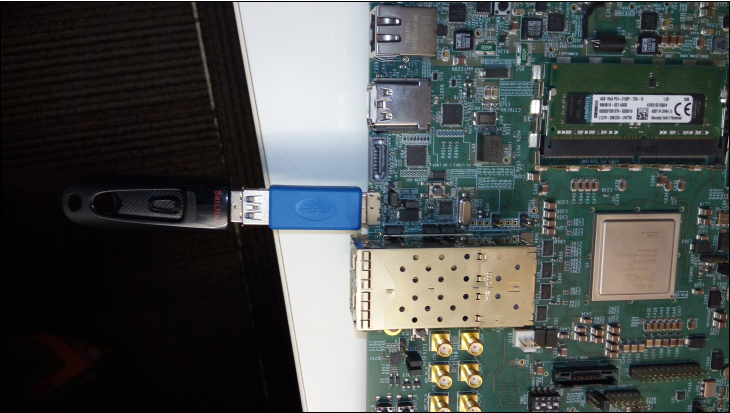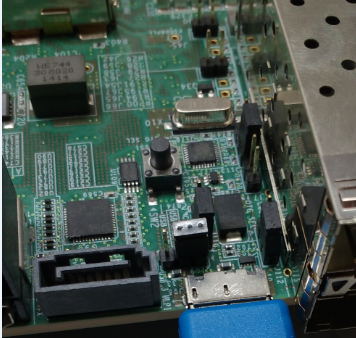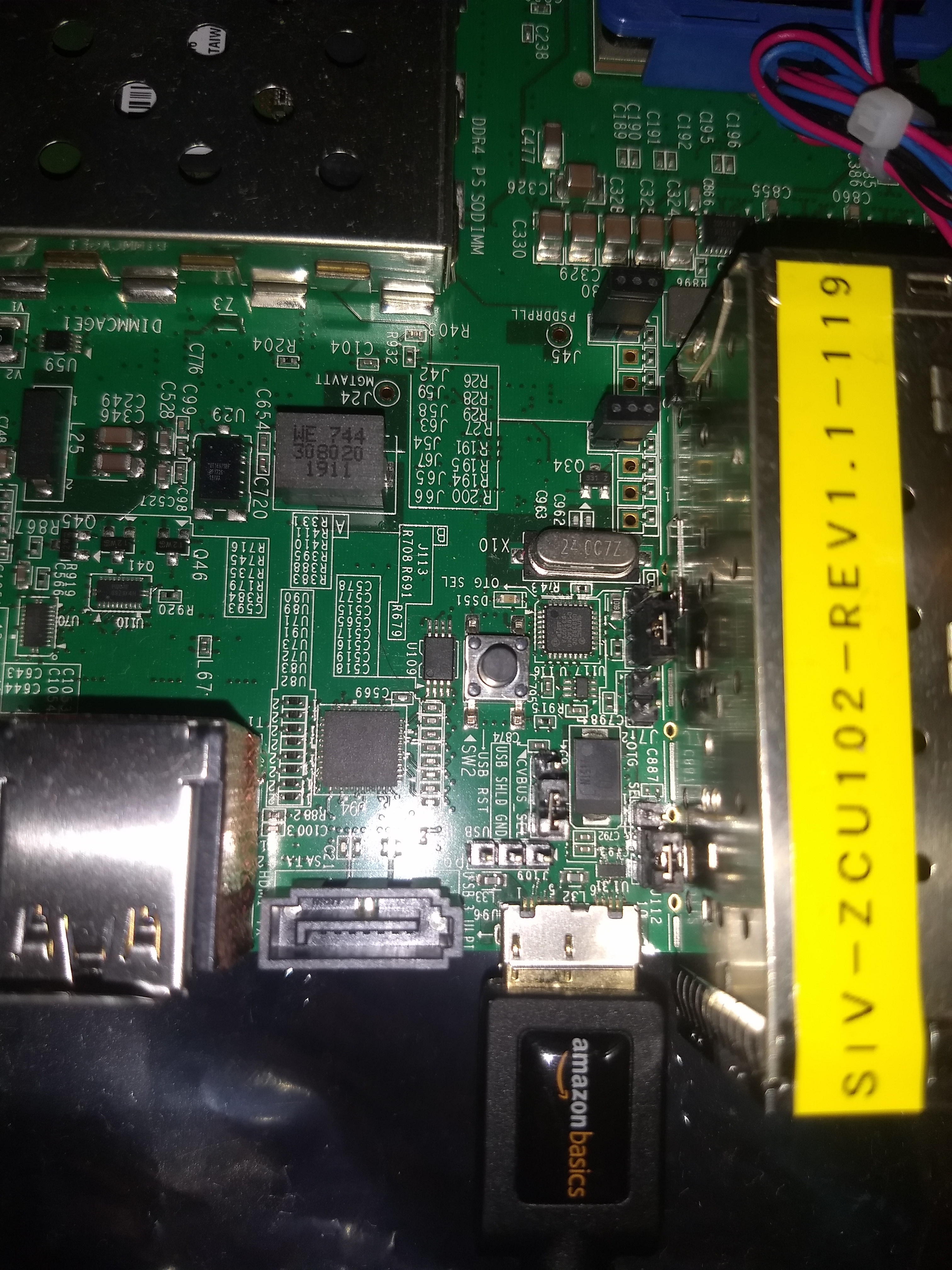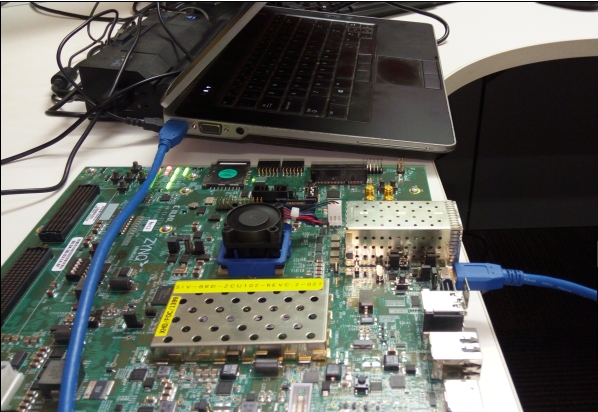Introduction
USB 3.0 is the second major revision of the Universal Serial Bus (USB) standard for computer connectivity. USB 3.0 implements a 5.0 Gbit/s raw transfer rate using 8b/10b encoding. USB 2.0 implements the Hi-Speed mode (HS – 480 Mbit/s), while USB 1.1 implements Low Speed (LS) – 1.5 Mbit/s and Full Speed (FS) – 12 Mbit/s). The USB 3.0 Controller used shall provide one 5.0Gbit/s USB channel using the PS internal GT as PHY.Table of Contents
Table of Contents
HW/IP Features
The ZynqMP USB 3.0 Controller shall provide one 5.0Gbit/s USB channel using the PS internal GT as PHY.- Two USB 2.0/3.0 controllers
- Compliant with USB 3.0 specs
- Compliant with xHCI standard
- Supports 5.0 Gbps data rate
- Support host, device and OTG modes
- Support On The Go (OTG) 2.0 host/device selection
- Provide simultaneous operation of the USB2.0 and USB3.0 interfaces where applicable
- In host mode, as required by the standard for speed negotiation and switching
- In device mode, statically configured as USB2.0 or USB3.0
- In OTG mode, dynamically switch between host role and device role
- HNP, SRP supported at USB 2.0 speeds in OTG
- DRD supported in USB 3.0 speeds
- 64-bit AXI master port with built-in DMA
- Register programming via AXI and/or APB slave ports
- Power management features: hibernation mode
- Support 44-bit address space
- Supports Link Power Management (LPM) transfers to save power when bus is idle
Features supported in driver
- All the HW/IP features are supported by driver
Missing Features, Known Issues and Limitations
- ZynqMP USB 3.0 controller doesn't support USB 3.0 OTG (On The Go) host/device selection
Host Mode
ZCU102 board jumper settings for Host modeJ7 - ON
J113 - 1-2
J110 - 2-3
Please refer the below image for jumper settings on ZCU102 board
USB 3.0 Host mode setup snapshot
Kernel Configuration
| Code Block | ||
|---|---|---|
| ||
Device Drivers------>
USB support
<*> xHCI HCD (USB 3.0) support
<*> USB Mass Storage support
<*> DesignWare USB3 DRD Core Support
DWC3 Mode Selection (Dual Role mode) --->
(X) Dual Role mode |
By enabling the above we need to see the below mentioned Kconfig parameter enabled
CONFIG_USB_DWC3 = y
CONFIG_USB_DWC3_DUAL_ROLE = y
CONFIG_USB_SUPPORT=y
CONFIG_USB_COMMON=y
CONFIG_USB_ARCH_HAS_HCD=y
CONFIG_USB=y
CONFIG_USB_XHCI_HCD=y
CONFIG_USB_XHCI_PLATFORM=y
Devicetree
| Code Block | ||
|---|---|---|
| ||
usb0: usb0@ff9d0000 {
#address-cells = <2>;
#size-cells = <2>;
status = "disabled";
compatible = "xlnx,zynqmp-dwc3";
reg = <0x0 0xff9d0000 0x0 0x100>;
clock-names = "bus_clk", "ref_clk";
power-domains = <&zynqmp_firmware PD_USB_0>;
ranges;
nvmem-cells = <&soc_revision>;
nvmem-cell-names = "soc_revision";
dwc3_0: dwc3@fe200000 {
compatible = "snps,dwc3";
status = "disabled";
reg = <0x0 0xfe200000 0x0 0x40000>;
interrupt-parent = <&gic>;
interrupt-names = "dwc_usb3", "otg", "hiber";
interrupts = <0 65 4>, <0 69 4>, <0 75 4>;
#stream-id-cells = <1>;
iommus = <&smmu 0x860>;
snps,quirk-frame-length-adjustment = <0x20>;
snps,refclk_fladj;
snps,enable_guctl1_resume_quirk;
snps,enable_guctl1_ipd_quirk;
snps,xhci-stream-quirk;
/* dma-coherent; */
/* snps,enable-hibernation; */
};
};
&usb0 {
status = "okay";
};
&dwc3_0 {
status = "okay";
dr_mode = "host";
}; |
Test Procedure
Connect the USB 3.0/2.0 pendrive to USB 3.0 capable board and see it getting detected in /dev/sd<x>.Expected Output
Once Linux boots the below highlighted prints should be visible when we connected the mass storage device| Code Block | ||
|---|---|---|
| ||
84943.023896] usb 2-1: new SuperSpeed USB device number 4 using xhci-hcd [84943.044949] usb 2-1: New USB device found, idVendor=0781, idProduct=5581 [84943.051579] usb 2-1: New USB device strings: Mfr=1, Product=2, SerialNumber=3 [84943.058695] usb 2-1: Product: SanDisk Ultra [84943.062858] usb 2-1: Manufacturer: SanDisk [84943.066939] usb 2-1: SerialNumber: A20037A3AD063355 [84943.072653] usb-storage 2-1:1.0: USB Mass Storage device detected [84943.078836] scsi host1: usb-storage 2-1:1.0 [84944.080804] scsi 1:0:0:0: Direct-Access SanDisk SanDisk Ultra PMAP PQ: 0 ANSI: 6 [84944.089531] sd 1:0:0:0: [sda] 30283008 512-byte logical blocks: (15.5 GB/14.4 GiB) [84944.097708] sd 1:0:0:0: [sda] Write Protect is off [84944.103904] sd 1:0:0:0: [sda] Write cache: disabled, read cache: enabled, doesn't support DPO or FUA [84944.309725] sda: [84944.312888] sd 1:0:0:0: [sda] Attached SCSI removable disk |
Performance
When Mass Storage device is connectedDevice used :
USB 3.0 : HP USB 3.0 16 GB pendrive (idVendor=03f0, idProduct=4840)
USB 3.0 - UASP capable drive - Transcend Storjet 128GB
USB 2.0 : Sandisk Cruzer Blade USB 2.0 8 GB Pendrive (idVendor=0781, idProduct=5567)
Using HDPARM tool
| Mode | Speed |
| USB 3.0 (Super Speed) | 128 MB/sec |
| USB 3.0 (UASP capable) | 327.10 MB/sec |
| USB 2.0 (High Speed) | 25.48 MB/sec |
Note : Above results may vary from device to device
When Ethernet device is connected
Device used :
USB 3.0/2.0 : Xilinx ZynqMP RNDIS/Ethernet Gadget
Using Iperf tool (TCP)
| Mode | Speed |
| USB 3.0 (Super Speed) | 761.6 Mbits/sec |
| USB 2.0 (High Speed) | 467.2 Mbits/sec |
Using Iperf tool (UDP)
| Mode | Speed |
| USB 3.0 (Super Speed) | 761.6 Mbits/sec |
| USB 2.0 (High Speed) | 467.2 Mbits/sec |
Note : The above results are taken with LPM mode disabled
Peripheral Mode
ZCU102 jumper settings for Peripheral modeJ7 - OFF
J113 - 1-2
J110 - 1-2
J109- No jumper
Please refer the below image for jumper settings required for peripheral mode on ZCU102 board
USB 3.0 peripheral mode setup snapshot
...
Commits:
2019.2
Summary:
- Add support for disabling U1 and U2 entries
- Add support for masking phy reset signal
- Add wakeup capability support for versal usb controller
- Add D0/D3 entry/exit support for versal
Commits:
2020.1
Summary:
- kernel upgrade to 5.4
Latest commit for kernel 5.4:
2020.2
Summary:
- None
Related Links
...




